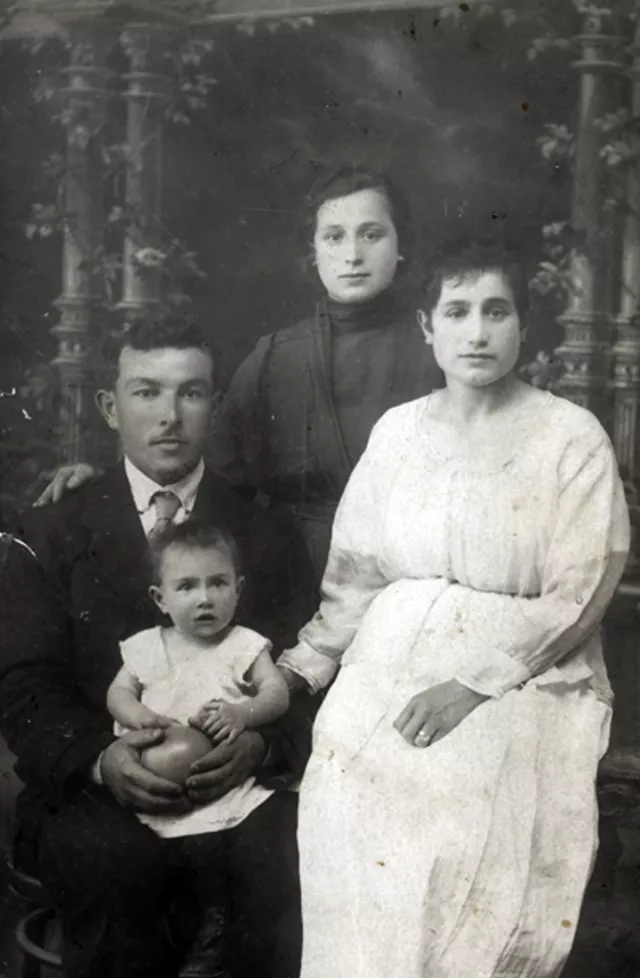This is our family: my parents, father and mother; in the background - Aunt Marusya, below is my sister Tsilya [1924-1950].
I was not born then yet. I know nothing about this photo, I found it in my father's photo album.
My mother, Klara Zakharovna, they also called her Khayusya in Jewish way, was, like granddad, a kind, good and sympathetic person. She was born in 1906 and died in 1987. She is buried beside my sister Tsilya.
Mum studied, as she told me, in a Jewish school, there were 4 grades. Rather early, in 16 years of age, she was affianced to Daddy, so she probably studied at school until she turned 16. They spoke only Yiddish at home, and used Russian only talking to children and neighbors. Both languages were spoken.
During the First World War [1914-1918], Daddy stayed in their house in Belorussia for some time [that is, being a soldier, was quartered in their house]. He was a medical assistant. Grandmother had given him education. He finished a medical assistants school. He liked Mum very much, and they became engaged.
They got acquainted in their house, where he stayed. They got married in the synagogue, already in St. Petersburg, grandfather ordered them to come here and there was a real wedding ceremony. They had received a marriage certificate in Hebrew or Yiddish,
I don't know exactly, in the synagogue. Daddy was born in 1898. She was 18, and he was 26. And then, because grandmother lived in Vladikavkaz, they moved there after my birth.
In Vladikavkaz we had one half of a house, a one-storied building, all houses were basically one-storied there. Three good rooms: a nursery, a dining room and the bedroom for parents. The kitchen was shared with the neighbors.
The neighbors were under supervision, because he was a former White Army soldier and she was a teacher, so they were often visited by NKVD [NKVD - the People's Commissariat of Internal Affairs of the USSR]. We had very good relations with our neighbors. In the court yard there was a front garden, with trees and acacia, I remember it well.
We, children, used to climb and eat it, the white acacia - it was very tasty. There were other bushes and garden flowers. Mum loved gardening very much. We lived not without troubles, but I think we could make ends meet.
My sister [Tsitsilia] was 3 years older than I was, she was born in 1924, and I - in 1927, and 10 years later my brother Vladimir was born there, in Vladikavkaz [1937].
Daddy was an actor by nature, he acted in the national Ossetin theater in Vladikavkaz. He was companionable, emotional, and Mum was silent, quiet. I, probably, took after my father. I always remember father in good mood, he was always affable to people, he had a very good voice, he sang and participated in Jewish performances.
The theater was located in Stalin Avenue, in the center. And they staged various plays, Russian, Ossetin and Jewish. My recollections are obscure, I was a girl then, but I attended with pleasure, saw all those performances. Daddy knew several languages: Ossetin, Armenian, Georgian and naturally Jewish. And in general he was a wonderful man. He also sang at home.
My parents basically led a secular life, traditions were only observed at grandmother's home. With my parents we used to celebrate the Soviet holidays.
We had an Armenian family visiting us, we put up a huge table right in the court yard, which was surrounded with a fence. Everyone who wished sat down at that table, usually all the neighbors, Daddy sang, and it was always a lot of fun.
Daddy was transferred to Leningrad in 1939. He was a railway man, and from the North-Osetiya Railway he was transferred to the October Railway , just before the war with Finns [1939-1940].
We moved, exchanged our apartment for a room in Leningrad in Razyezhaya Street [a street in the center of Saint Petersburg]. And later Daddy exchanged that room in Razyezhaya for an apartment in Nevsky Avenue [Nevsky Avenue - the central street of Saint Petersburg].

















